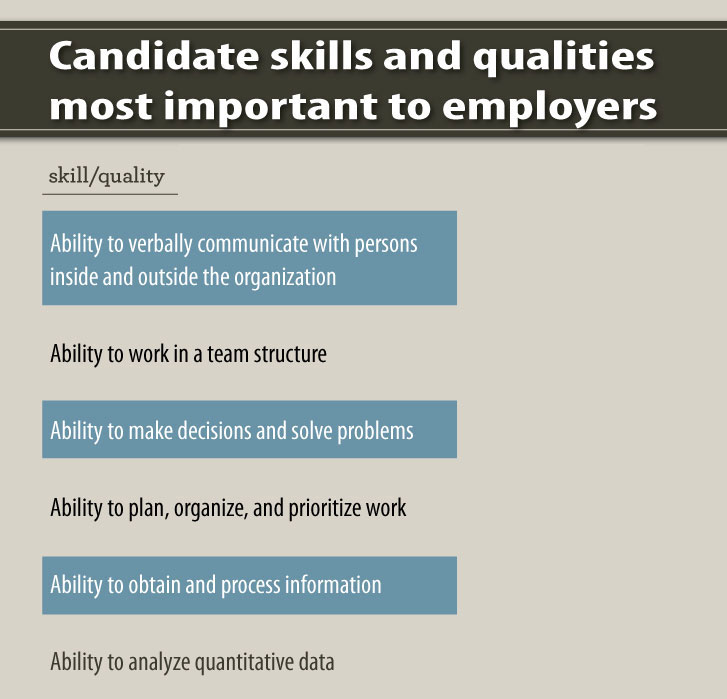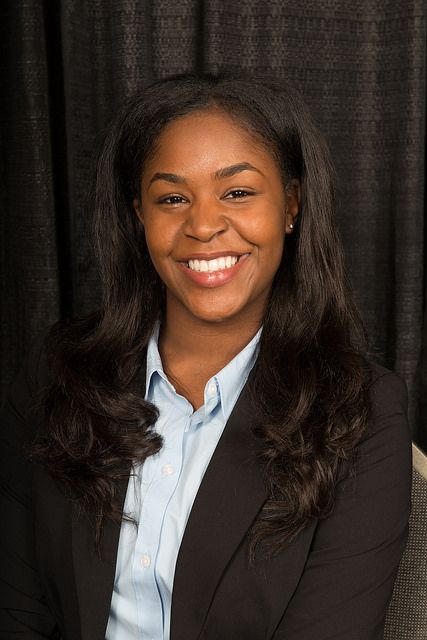Her light brown eyes that were full of youthful hope for the future seemed to become clouded like a gray, overcast sky on a soon-to-be rainy day. She rocked in her seat as she spoke with a little less anticipation than her career advisor usually witnessed from their passionate conversations. “Just two more semesters before I put on my cap and gown,” she shared as she looked aimlessly down at the floor twisting the golden ring on her middle finger that she bought just a week ago as a personal graduation present. “Seriously! As much as I love my major, what in the world am I going to do with this degree?”
This is a common dilemma for many graduating students, particularly those studying liberal arts. But the outlook for those in these fields isn’t as tough as it may seem for these soon-to-be professionals. In fact, what leads to a candidate’s potential for finding a great job or career path may be much easier than one may think.
Skills matter
The National Association of Colleges and Employers (NACE) and professionals in the career services field have always found that employers want candidates with skills that enable them to contribute to their organization’s overall success. But over the past few years, the most desirable skills are ones that cut across all majors. According to an online survey conducted by Hart Research Associates, 93 percent of employers surveyed stated candidates’ capacity to think critically, communicate clearly, and solve complex problems are even more important than one’s undergraduate field of study.*

According to the National Association of Colleges and Employers 2016 Job Outlook, employers look at more than an applicant’s major when choosing candidates.
Furthermore, NACE has recently adopted career readiness competencies that incorporate similar concepts. While field-specific knowledge developed through their college education is essential, students need to develop and expand their skills so they can position themselves as professionals with knowledge, experience, and as essential-skill holders. They can do so by taking their industry knowledge, principles, and theories learned and applying them into class projects, volunteer work, practicums or internships, or active involvement in registered student organizations (RSOs). These experiences allow them to not only develop their skills, but also help them to identify and promote those skills when seeking and applying for jobs, even those outside their major.
“Students typically focus on researching career options only through the lens of their major, instead of looking more broadly at the skills that they possess that can open many career options available to them within various industries,” said Career Center Associate Director for Student Relations Mike Minton, Ph.D. “However, careers are not that easily identifiable for all majors, especially those in liberal arts.
“Philosophy, history, anthropology, and geology are a few good examples. Students have developed some highly desirable skills through their education, such as writing, communication, data analysis, and creating and conducting presentations. If students combine these skills with those developed through on-campus involvement in RSOs and/or internship experiences, they can expand their career options. They just have to think outside the box of traditional jobs that they may think their majors fit into.”
For example, according to Department of Sociology and Anthropology Chair James Skibo, students don’t have to major in business or management in order to work in the corporate world.
“We have seen them enter management trainee programs, become human resource managers, researchers, and even marketing professionals, all at major corporations,” Skibo said. “We’ve seen some become attorneys. Another works at IBM. Another is a researcher at a major museum, while another conducts policy analysis at a medical institute. Then, there are those who stay in their industry but take on a different type of role, like one of our alums who started her career as a grant writer at a local nonprofit organization, and moved up to become the assistant director.”
Redbird reflects bright outlook

Raven Harrington uses the transferable skills she attained in sociology to be successful in her role as a management trainee.
Raven Harrington ’16 is a Redbird who took advantage of the many transferable skills that she developed from her undergraduate study in sociology and applied to a position atypical to her major.
She is currently in Minnesota serving the first year of a two-year assignment as a management trainee for the rental division at Cintas Corporation.
As a sociology major, business management was not where Harrington saw her future when she first came to Illinois State as a transfer student in 2013. But after taking classes in sociology and learning essential skills such as communication, relationship building, and working with diverse people, her role at Cintas isn’t too far removed from her major as one may think.
“I loved studying sociology. I had so many amazing opportunities where I was able to touch the lives of others. I served as a resident associate for a homeless shelter, managed crisis calls at a community center as a volunteer, and counseled teenage boys suffering from substance abuse at a neighborhood service organization as an intern. All were the kind of experiences that you would expect as a sociology major,” said Harrington.
“But what I learned from those experiences is what made me a professional. I learned how to adapt to people who are different from me: by age, race, education, or life experience. I learned how to listen to others to really hear and understand their needs so that I can help solve their problems or provide effective solutions.
“I use those skills daily as I serve my customers, my colleagues, and my supervisors. The communication and interpersonal skills that I developed while serving clients as a student are extremely valuable to me and always will be no matter what career I am in.”
Harrington attributes her career success not only to the opportunities provided to her by her academic program, but also to those she took advantage of from the Career Center.
“I met Career Center Director and Illinois State alum Pamela Cooper ’94 from a fellow student,” Harrington said. “As I shared my interests with her, she introduced me to employers at career fairs. (That’s how I met the recruiters from Cintas.) Later, she introduced me to Career Advisor Laurenn York, who showed me how to think about my skills and experiences more broadly to see the many career opportunities I could pursue. She also showed me how to restructure my résumé to display my skills, and conducted mock interviews with me. They really helped me to reinvent myself from a student to a professional.”
University collaboration
Partnerships between academic departments and the Career Center are key to helping students find success regardless of their major.
“We work together to help our students,” said Sociology and Anthropology Undergraduate Advisor Ryan Gray, who also teaches the department’s Careers in Sociology course, SOC 292. “When the Career Center hosts InstaCareer, students in my class are required to attend to gain valuable tips on how to connect with employers at the career fairs. In addition, when there is a career fair, I strongly encourage students to attend it as well to explore career employment options. Our department also requires students to attend the Career Center’s What to Do with THAT Degree, a program for all students, but is particularly helpful for those in the liberal arts.”
The alumni connection
Alumni are also essential to helping liberal arts students find career success as well. As a sociology major, Harrington attended Cultural Career Network programs where she learned from Redbird alumni how to connect and network with employers from a variety of industries.
“I owe a lot of my success not only to the quality education that I received, but to the professional connections that the Career Center made available to me,” Harrington said. “Those connections lead me to career options that I never considered before.”
Since the College of Arts and Sciences has the largest population of students, there are many alumni who are familiar with non-traditional opportunities that exist for liberal arts students. Each year the Career Center and the College of Arts and Sciences invite those alumni to come back to campus for What to Do with THAT Degree to share their career experiences and give students insight into career opportunities that they may not may not have considered.
In addition to the advice that the alumni share with the students, they also become professional connections for them. In one instance, an alum who worked at IBM was so impressed with a student that he met at a College of Arts and Sciences event that he emailed his colleagues about the student during the event and helped the student make a connection.
“Illinois State is pleased to have alumni return to campus to share their success with our students, or to recruit a Redbird,” said Cooper. “And the Career Center is ready to help students from all majors to make those connections with them.”
Even though she just graduated this May, Harrington came back to campus to recruit students on behalf of her employer, Cintas, which is also a Platinum member of the Career Center Partner Program.
“It is ironic to be at my alma mater recruiting Redbirds for Cintas,” she said. “Illinois State helped me to become the professional I am today and to connect with Cintas. Now I am here to do the same for someone else. It’s something I never would have imagined doing as part of my career.”
During changing economic conditions, finding the perfect job can seem like finding a needle in a haystack. But students from all majors, including liberal arts, don’t have to wrestle with doubts and fears about their careers. By taking the knowledge that they learned in the classroom and applying to experiential activities, students will be able to develop and identify their skills and apply them to multitudes of career opportunities. Then when they combine along with their Illinois State connections including faculty, staff, alumni, and other professionals, the career outlook for Redbirds is strong.
Today, that once reluctant senior sitting across from her career advisor is proud to share with other Redbirds how she was able to confidently put on her cap and gown and proudly cross the stage. She is now able to not only rejoice in what she has accomplished, but is also rejoicing in the anticipation of what she has yet to achieve.
Final advice to liberal arts students
To students who are unsure of what to do with their degree, Harrington provides the following advice:
- Study what you love. Assess what your strengths and identify where you get the greatest satisfaction and start there. Everything else will follow because you are following your passion.
- Don’t listen to the critics, whether they are others or yourself. Stay focused and absorb all that you can from your education.
- Get involved! Participate in university programs, attend events, apply for an internship. Put yourself out there and meet people and don’t be afraid to try something new.
- Make connections with faculty and the Career Center. They are here to help you and know what is important. Let them guide and support you. They can impact your future.
- Don’t worry about your career path. Liberal arts majors can find jobs!
*It Takes More than a Major: Employer Priorities for College Learning and Student Success, Association of American Colleges & Universities, spring 2013

